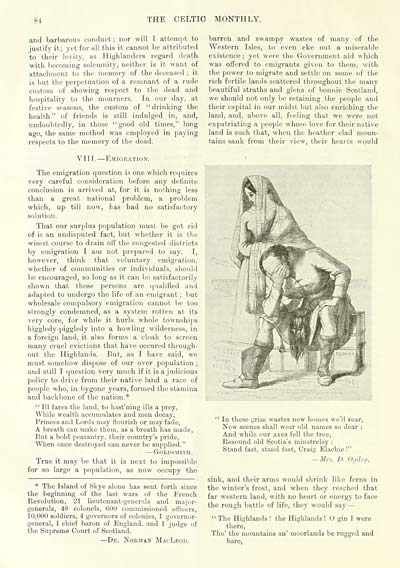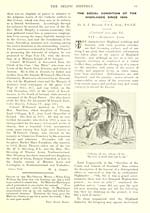Blair Collection > Celtic monthly > Volume 7, 1899
(124)
Download files
Complete book:
Individual page:
Thumbnail gallery: Grid view | List view

THE CELTIC MONTHLY.
and barbarous conduct; nor will I attempt to
justify it; yet for all this it cannot be attributed
to their levity, as Highlanders regard death
with becoming solemnity, neither is it want of
attachment to the memory of the deceased ; it
is but the perpetuation of a remnant of a rude
custom of showing respect to the dead and
hospitality to the mourners. In our day, at
festive seasons, the custom of "drinking the
health " of friends is still indulged in, and,
undoubtedly, in those "good old times," long
ago, the same method was employed in paying
respects to the memory of the dead.
VIII. — Emigration.
The emigration question is one which requires
very careful consideration before any definite
conclusion is arrived at, for it is nothing less
than a great national problem, a problem
which, up till now, has had no satisfactory
solution.
That our suri)lus population must be got rid
of is an undisputed fact, but whether it is the
wisest course to drain ofl' the congested districts
by emigration I am not prepai'ed to say. T,
however, think that voluntary emigration,
whether of communities or individuals, should
be encouraged, so long as it can be satisfactorily
shown that those persons are qiialified and
adapted to undergo the life of an emigrant; ))ut
wholesale compulsory emigration cannot be too
strongly condemned, as a system rotten at its
very core, for while it hurls whole townshii)s
higgledy-piggledy into a howling wilderness, in
a foreign land, it also forms a cloak to screen
many cruel evictions that have occured through-
out the Highlands. But, as I have said, we
must somehow dispose of our over population ;
and still I question very much if it is a judicious
policy to drive from their native land a race of
people who, in bygone years, formed the stamina
and backbone of the nation.*
" 111 fares the land, to hast'ning ills a prey.
While wealth accumidates and men deca}'.
Princes and Lords may flourish or may fade,
A breath can make them, as a breath has made,
But a bold peasantry, their country's pride.
When once destroyed can never be supplied."
— Goldsmith.
True it may be that it is next to impossible
for so large a population, as now occupy the
* The Island of Skye alone has sent forth since
the beginning of the last wars of the French
Revolution, 21 lieutenant-generals and major-
generals, 48 colonels, GOO commissioned ofHcers,
10,000 soldiers, 4 governors of colonies, 1 governor-
general, 1 chief baron of England, and 1 judge of
the Supreme Court of Scotland.
—Dr. Nokman Mai Leop.
barren and swampy wastes of many of the
Western Isles, to even eke out a miserable
existence ; yet were the Government aid which
was oflfered to emigrants given to them, with
the power to migrate and settle on some of the
rich fertile lands scattered throughout the many
beautiful straths and glens of bonnie Scotland,
we should not only be retaining the people and
their capital in our midst but also enriching the
land, and, above all, feeling that we were not
expatriating a people who.se love for their native
land is such that, when the heather clad moun-
tains sank from their view their hearts would
" In these grim wastes new homes we"ll rear.
New scenes shall wear old names so dear ;
And while our axes fell the tree,
Resound old Scotia's minstrelsy :
Stand fast, stand fast, Craig Elachie !"
—Mrs. D. O.jlln/.
sink, and their arms would shrink like ferns in
the winter's frost, and when they reached that
far western land, with no heart or energy to face
the rough battle of life, they would say —
" The Highlands ! the Highlands ! O gin I were
there,
Tho' the moinitains an' moorlands be rugged and
bare.
and barbarous conduct; nor will I attempt to
justify it; yet for all this it cannot be attributed
to their levity, as Highlanders regard death
with becoming solemnity, neither is it want of
attachment to the memory of the deceased ; it
is but the perpetuation of a remnant of a rude
custom of showing respect to the dead and
hospitality to the mourners. In our day, at
festive seasons, the custom of "drinking the
health " of friends is still indulged in, and,
undoubtedly, in those "good old times," long
ago, the same method was employed in paying
respects to the memory of the dead.
VIII. — Emigration.
The emigration question is one which requires
very careful consideration before any definite
conclusion is arrived at, for it is nothing less
than a great national problem, a problem
which, up till now, has had no satisfactory
solution.
That our suri)lus population must be got rid
of is an undisputed fact, but whether it is the
wisest course to drain ofl' the congested districts
by emigration I am not prepai'ed to say. T,
however, think that voluntary emigration,
whether of communities or individuals, should
be encouraged, so long as it can be satisfactorily
shown that those persons are qiialified and
adapted to undergo the life of an emigrant; ))ut
wholesale compulsory emigration cannot be too
strongly condemned, as a system rotten at its
very core, for while it hurls whole townshii)s
higgledy-piggledy into a howling wilderness, in
a foreign land, it also forms a cloak to screen
many cruel evictions that have occured through-
out the Highlands. But, as I have said, we
must somehow dispose of our over population ;
and still I question very much if it is a judicious
policy to drive from their native land a race of
people who, in bygone years, formed the stamina
and backbone of the nation.*
" 111 fares the land, to hast'ning ills a prey.
While wealth accumidates and men deca}'.
Princes and Lords may flourish or may fade,
A breath can make them, as a breath has made,
But a bold peasantry, their country's pride.
When once destroyed can never be supplied."
— Goldsmith.
True it may be that it is next to impossible
for so large a population, as now occupy the
* The Island of Skye alone has sent forth since
the beginning of the last wars of the French
Revolution, 21 lieutenant-generals and major-
generals, 48 colonels, GOO commissioned ofHcers,
10,000 soldiers, 4 governors of colonies, 1 governor-
general, 1 chief baron of England, and 1 judge of
the Supreme Court of Scotland.
—Dr. Nokman Mai Leop.
barren and swampy wastes of many of the
Western Isles, to even eke out a miserable
existence ; yet were the Government aid which
was oflfered to emigrants given to them, with
the power to migrate and settle on some of the
rich fertile lands scattered throughout the many
beautiful straths and glens of bonnie Scotland,
we should not only be retaining the people and
their capital in our midst but also enriching the
land, and, above all, feeling that we were not
expatriating a people who.se love for their native
land is such that, when the heather clad moun-
tains sank from their view their hearts would
" In these grim wastes new homes we"ll rear.
New scenes shall wear old names so dear ;
And while our axes fell the tree,
Resound old Scotia's minstrelsy :
Stand fast, stand fast, Craig Elachie !"
—Mrs. D. O.jlln/.
sink, and their arms would shrink like ferns in
the winter's frost, and when they reached that
far western land, with no heart or energy to face
the rough battle of life, they would say —
" The Highlands ! the Highlands ! O gin I were
there,
Tho' the moinitains an' moorlands be rugged and
bare.
Set display mode to: Large image | Transcription
Images and transcriptions on this page, including medium image downloads, may be used under the Creative Commons Attribution 4.0 International Licence unless otherwise stated. ![]()
| Early Gaelic Book Collections > Blair Collection > Celtic monthly > Volume 7, 1899 > (124) |
|---|
| Permanent URL | https://digital.nls.uk/75859958 |
|---|
| Shelfmark | Blair.59 |
|---|---|
| Additional NLS resources: | |
| Attribution and copyright: |
|
| Description | A selection of books from a collection of more than 500 titles, mostly on religious and literary topics. Also includes some material dealing with other Celtic languages and societies. Collection created towards the end of the 19th century by Lady Evelyn Stewart Murray. |
|---|
| Description | Selected items from five 'Special and Named Printed Collections'. Includes books in Gaelic and other Celtic languages, works about the Gaels, their languages, literature, culture and history. |
|---|

